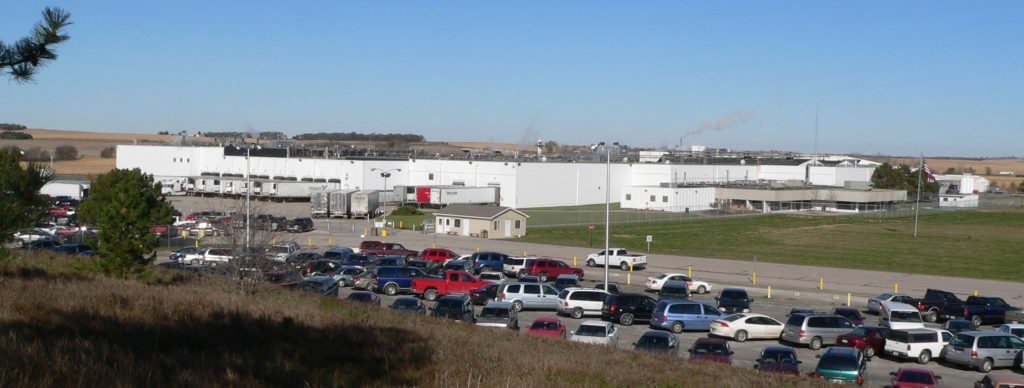
A TYSONS PLANT
May 14. By Dave Yochum. As more meat processing plants in North Carolina experience coronavirus outbreaks, workers, labor unions and advocacy groups are calling for more safety measures due to COVID-19.
There have been more than 800 confirmed cases of COVID-19 at plants across the state. In the past few weeks, there have been outbreaks at both poultry and pork processing plants, such as Smithfield Foods, where workers in Tar Heel and Clinton have reported unsanitary conditions and a rising number of COVID-19 cases.
Workers do not have paid sick days.
Meanwhile, some plants are paying bonuses to keep workers on the production lines.

ZACK WYATT IS THE FOUNDER OF CORNELIUS-BASED CAROLINA FARM TRUST
“The industrial food chain is trying to meet demand,” said Zack Wyatt, the Cornelius resident who is the founder of Carolina Farm Trust, an organization that seeks to preserve local farming.
“As consumers we have to reevaluate the cost and value of food and how it is raised, processed and delivered to us. If we want change then we will need to change our buying habits,” he said.
The Farmworker Advocacy Network is formally asking NC Gov. Roy Cooper to take special measures to require sanitizing stations, temperature checks, staggered bathroom and lunch breaks, fresh gloves and providing more breathing room workers on high-speed meat processing lines.
COVID outbreaks
Coronavirus outbreaks have been reported in meat processing plants in 17 counties, according to the state Department of Health and Human Services.
The NCDHHS defines an outbreak as two or more workers at a plant being diagnosed with COVID-19.
Statewide, more than 1,500 workers at 26 plants have been infected, a 60 percent increase from a week ago. The plants are in 17 counties from Bertie and Bladen to Wilkes and Wilson.
The Centers for Disease Control and Prevention says there is no evidence to suggest that the coronavirus can be transmitted through food.
But workers at Case Farms in Morganton described being given a single, thin mask to use for months at a time. “We have to pay for food, we have to pay for rent, and so we can’t miss work,” one worker said.
Some meat plants are closing
While the meat is not dangerous in spite of infected workers handling it, production lines can shut down when too many workers are sick.
The Smithfield Foods hog slaughterhouse in Tar Heel in Bladen County is believed to be the largest hog slaughterhouse in the world, processing some 35,000 hogs a day and employing more than 4,400 workers.
Just this month a Johnsonville sausage plant in Holton, Kan. closed its facility after positive tests of COVID-19, Tyson Foods Inc. closed its pork facility in Madison, Neb., and Cargill closed its beef plant in Schuyler, Neb.
“Meatpacking and poultry workers are at the frontlines of this pandemic – these workers are putting their lives on the line every day,” said Andre Barnett with UFCW 1208, the nation’s largest food processing union, which represents workers at Smithfield Foods in Tar Heel. “More than ever, companies must be held accountable. It’s not about politics but about the safety of workers.”
Billion-dollar industry
Meat processing is a billion-dollar industry in North Carolina. Hog farming and pork product processing are major industries here, especially the eastern part of the state. In 2012, the industry employed nearly 13,000 people in North Carolina across all stages of the value chain, according to the NC in the Global Economy website.
“As part of America’s industrial food chain, these companies will do everything they can to keep the lines running, no matter the cost to workers,” said Angela Stuesse, an associate professor at UNC-Chapel Hill.
She said the meat and poultry industry puts profit over people.
“Many knew about outbreaks for weeks before telling their employees. This industry will not regulate itself,” Stuesse said, explaining that change is needed.
“Supporting our local farms is a good start to drive that change,” Wyatt said.

Discussion
No comments yet.